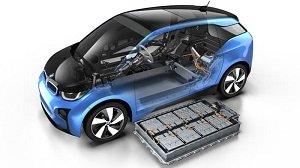BMW have finally revealed that they intend to get into the energy storage system market and compete against manufacturers like Tesla, Daimler (Mercedes Benz) and Nissan. BMW will be repurposing their i3 model batteries for home storage systems once the batteries have served their purpose inside the car. Once an electric vehicle has used a percentage of a lithium-ion battery's recharge cycles, it is illegal to keep it inside a car, however, the battery retains enough of its power to act as a solar energy storage unit for households. Nissan will be putting their Leaf vehicle's batteries on walls once they are past their prime as well.
 Credit: BMW
Credit: BMW
The product was announced at BMW's very own electric vehicle facility in Montreal, Canada. The company pointed out that their offerings stand out above the crowd due to being a repurposed car battery and not a full battery pack like Tesla has developed. The technology has recently been branded 'car-to-grid' technology.
The unit gets its electricity from solar panels and is able to provide that electricity to households during peak hours to save consumers some of their hard-earned cash once the cost of energy provided by the grid is at its highest. It can also power the household once an outage occurs. Along with PV module and the storage unit, you get the converter and equipment that will all be inclusive in the installation rates.
How much juice are we talking here? BMW will be selling stackable 22-kWh or 33-kWh packs. This would definitely be able to power most of the appliances in a house for a 24 hour period. The average household in the United States uses 30kWh per day. BMW also confirm that the battery can be used to charge electric vehicles.
Cliff Fietzek, manager of Connected eMobility at BMW USA, said: "The remarkable advantage for BMW customers in using BMW i3 batteries as a plug and play storage application is the ability to tap into an alternative resource for residential and commercial backup power, thus using renewable energy much more efficiently and enabling additional revenues from the energy market."
An update to our wall of competitors is in order:
| Tesla PowerWall | Mercedes | Nissan xStorage | BMW |
| Stores 6.4kWh | Stores 2.5kWh | Stores 4.2kWh | TBD |
| Storage stacking: 9 PowerWalls can be connected to equal 58kWh | Storage stacking: 8 Mercedes batteries to equal 20kWh | Storage stacking: 8 batteries to equal 20kWh | Storage stacking: 22kwH or 33kwH |
| Price: Up to $7,000 each including installation | Price: Up to $10,000 each including installation | Price: $4,500 each including installation | TBD |
Source: Autoblog
